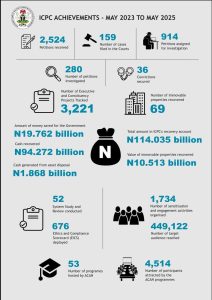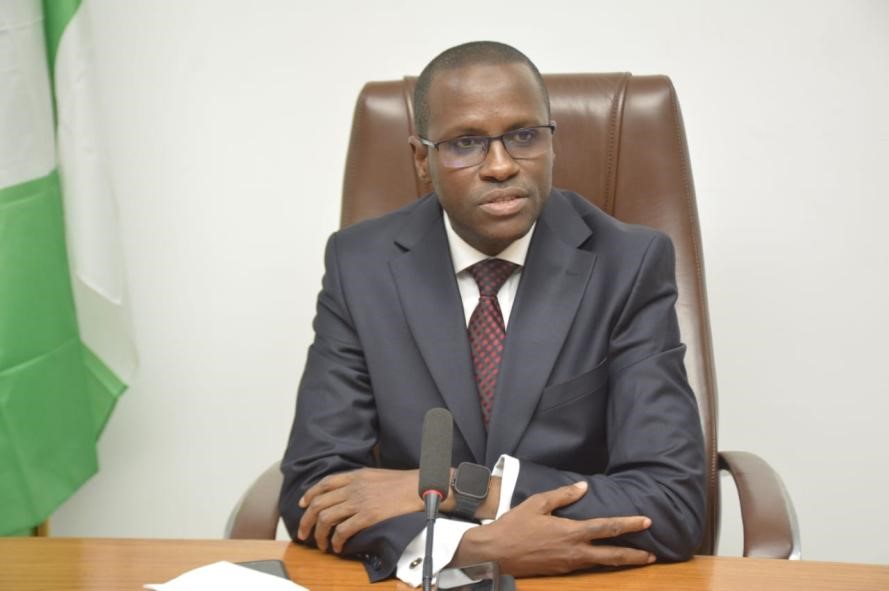Over the past two years, the Independent Corrupt Practices and Other Related Offences Commission (ICPC) has demonstrated an unwavering commitment to combat corruption across Nigeria’s public and private sectors. As one of the country’s foremost anti-corruption agencies, the ICPC is pivotal in promoting transparency, enhancing institutional integrity, and safeguarding public resources.
Established by law to uphold ethical conduct and deter corrupt practices, the ICPC adopts a comprehensive and proactive approach to addressing corruption, which remains one of the most significant threats to Nigeria’s development. Its core mandate includes the prohibition, prevention, and investigation of corrupt acts such as bribery, embezzlement, abuse of office, and fraud.
Central to the Commission’s work is the prevention of corruption through the development and enforcement of robust systems, regulations, and policies designed to close loopholes that enable unethical behaviour. The ICPC collaborates with Ministries, Departments, and Agencies (MDAs), as well as private entities, to implement anti-corruption measures, institutional reforms, and integrity-driven practices.
In its investigative role, the ICPC conducts meticulous inquiries into allegations of corruption, ensuring that every case is handled with fairness, objectivity, and professionalism. Investigations often involve evidence gathering, interviews with witnesses and whistleblowers, and coordination with law enforcement agencies and the judiciary. The Commission’s efforts have led to the prosecution and conviction of several individuals found guilty of misappropriating public funds, sending a strong message that impunity will not be tolerated.
Beyond enforcement, the ICPC is equally focused on promoting a culture of integrity and accountability. Through advocacy, public enlightenment campaigns, and educational programmes—such as the National Ethics and Integrity Policy and the establishment of Anti-Corruption and Transparency Units (ACTUs) in government institutions—the Commission fosters civic responsibility and ethical behaviour among citizens and public servants alike.
The ICPC has strengthened its preventive strategy in the last two years by proactively conducting system reviews and corruption risk assessments across key sectors such as education, health, and local governance. These forward-looking initiatives enhance institutional integrity by identifying potential vulnerabilities and recommending practical solutions that promote transparency, efficiency, and accountability.
Ultimately, the ICPC stands as a pillar in Nigeria’s anti-corruption architecture, working diligently to restore public confidence in governance and ensure that the nation’s resources are utilised for the collective good. Its multifaceted approach—combining prevention, enforcement, public engagement, and institutional reform—reflects a steadfast dedication to building a just, equitable, and corruption-free Nigeria.

.
Dr. Musa Adamu Aliyu, SAN, Chairman, ICPC
From May 2023 to March 2025, the Commission has made notable strides in its mission, implementing various initiatives to increase transparency and public trust in governmental operations. These efforts have included education and awareness campaigns to inform citizens about their rights and the mechanisms available for reporting corruption. The Commission has also enhanced its collaboration with other law enforcement agencies and civil society organisations to strengthen its investigative capacity and drive collective efforts against corruption. Through these proactive measures, the ICPC aims not only to penalise offenders but also to foster an environment of ethical governance and public service in Nigeria.
Strengthening Investigations and Legal Actions
During this reporting period, the Commission has processed a total of 2,524 petitions submitted by citizens and various organisations, reflecting a growing engagement in the fight against corruption. Out of these petitions, 914 were selected for further investigation due to their potential merit and seriousness, indicating the Commission’s proactive approach to addressing public concerns.
These investigations culminated in the filing of 159 cases in various courts, demonstrating the ICPC’s commitment to turning allegations of corruption into actionable legal proceedings. As a result of these efforts, there have been 36 convictions, despite the significant challenges posed by technicalities in criminal trials, which often prolong corruption cases for years before they are resolved. The Commission’s relentless efforts, despite these challenges, highlight its dedication to holding individuals accountable for corrupt practices. This level of enforcement not only deters future acts of corruption but also instils public confidence in the integrity of legal processes.
In addition to the cases filed, 280 petitions underwent extensive investigations. This thorough investigation process highlights the ICPC’s commitment to ensuring that cases are assessed methodically and fairly, adhering to the principles of due process. The rigorous examination of these petitions has allowed the Commission to discern valid claims and pursue justice where warranted.
The filing of these legal cases marks a significant advancement in Nigeria’s fight against corruption, representing a systematic effort to ensure that allegations are thoroughly vetted and addressed through appropriate judicial channels. Furthermore, several of these cases have become landmark rulings, establishing important legal precedents that will shape the future of anti-corruption laws and practices in Nigeria. These developments reflect not only the ICPC’s ongoing commitment to its mandate but also the broader societal commitment to eradicating corruption in all its forms.
Project Monitoring and Financial Recoveries
The ICPC has also been instrumental in monitoring 3,221 executive and constituency projects, ensuring that funds are used appropriately and that projects are executed as intended. Their interventions have led to savings of approximately N19.8 billion for the government, along with financial recoveries totalling N94.3 billion in cash, which has been deposited into the Commission’s recovery account. Furthermore, 69 immovable properties valued at N10.5 billion were successfully recovered, showcasing the proactive measures taken to reclaim stolen assets.
The monitoring of executive and constituency projects by the ICPC plays a crucial role in preventing fund mismanagement and diversion. Collaborating with civil society organisations and government agencies, the Commission ensures that these projects achieve their intended outcomes, ultimately enhancing public service delivery and infrastructure development. The recovery of N94.3 billion in cash and the savings of N19.8 billion reflect a significant achievement in protecting taxpayer money, allowing these funds to be redirected toward critical services such as healthcare, education, and infrastructure, thereby contributing to overall economic stability and the fight against illicit enrichment.
In 2024, the Commission’s asset disposal exercises, adjudged as transparent by Civil Society Organisations (CSOs) and other observers, generated N1.9 billion for the government, the highest amount since the Commission’s establishment in the year 2000.
Institutional Strengthening and Compliance Standards
In a concerted effort to bolster institutional integrity and address the pervasive issue of corrupt practices, ICPC has undertaken an extensive examination of public sector operations through the completion of 52 comprehensive systems studies and reviews. These thorough analyses have laid the groundwork for the implementation of the Ethics and Integrity Compliance Scorecard (EICS), which has been rolled out across a total of 676 entities.
These initiatives have resulted in significant operational improvements within the public sector, enhancing both efficiency and adherence to established ethical standards. By meticulously identifying and rectifying various inefficiencies present within government structures, the Commission is committed to maintaining processes that are transparent and free from corrupt influences.
Over the past two years, the deployment of the EICS across various Ministries, Departments, and Agencies (MDAs) has been pivotal in establishing clear accountability benchmarks. These benchmarks allow institutions to systematically evaluate their adherence to anti-corruption policies and procedures. As a result, entities are better equipped to not only measure their compliance but also to implement strategies for continuous improvement in their ethical conduct and operational integrity. This comprehensive approach positions the ICPC as a crucial player in fostering a culture of accountability and transparency within the public sector, thereby significantly contributing to the overarching goal of combating corruption in governance.
Public Engagement and Awareness
The ICPC has made a concerted effort to enhance public engagement in the fight against corruption by launching a variety of awareness campaigns and educational programmes. These initiatives are designed to inform citizens about their rights and highlight the detrimental impacts that corruption can have on society.
Within the period under review, the Commission undertook a rebranding of its television programme aired on the Nigerian Television Authority (NTA), now known as “Transparency File.” This program aims to bring important discussions about accountability and ethical conduct into the homes of Nigerians. In addition to traditional media, the ICPC has embraced digital platforms by introducing EthicsPod, the nation’s first anti-corruption podcast. This initiative not only diversifies the modes of communication but also seeks to engage a younger audience by making discussions about corruption and integrity accessible and relatable.
Recognising that combating corruption requires a unified effort from all sectors of society, the ICPC has substantially increased its sensitisation and engagement initiatives over the past two years. With a remarkable tally of 1,734 events held, the Commission reached an impressive number of approximately 449,122 individuals across the country. This extensive outreach reflects a growing network of informed citizens who are becoming increasingly active in the anti-corruption movement.
Furthermore, the Anti-Corruption Academy of Nigeria (ACAN) has played a crucial role in these efforts. The academy organised 53 specialised programmes that attracted a total of 4,514 dedicated participants. These programmes focused on promoting transparency and accountability, equipping attendees with the necessary knowledge and tools to foster ethical practices within their communities and professional environments.
Through these comprehensive efforts, the ICPC aims to cultivate a robust culture of integrity among the populace, empowering citizens to not only understand their rights but also actively participate in and contribute to the ongoing struggle against corruption in Nigeria.

Conclusion
The achievements recorded by the Independent Corrupt Practices and Other Related Offences Commission (ICPC) between May 2023 and March 2025 underscore a deliberate and strategic approach to tackling corruption in Nigeria. During this period, the Commission has intensified its efforts to promote transparency, accountability, and ethical governance across public institutions and government operations.
Central to the ICPC’s success has been the implementation of institutional reforms designed to strengthen the integrity of the public service. These reforms have introduced more robust oversight frameworks, streamlined reporting channels for corruption-related complaints, and enhanced internal controls within Ministries, Departments, and Agencies (MDAs). By reinforcing these systems, the Commission has significantly contributed to closing the gaps that often enable corrupt practices to flourish.
Moreover, the ICPC’s initiatives during this period have laid a strong foundation for sustainable governance and equitable development. Through targeted interventions—such as corruption risk assessments, system studies, and public awareness campaigns—the Commission has fostered a culture of integrity and civic responsibility. These efforts not only deter misconduct but also empower citizens and institutions to actively participate in the anti-corruption crusade.
While corruption remains a deeply rooted challenge in Nigeria, the ICPC’s consistent and methodical response reflects a clear commitment to long-term reform. The Commission’s work during this reporting period has not only addressed immediate infractions but has also contributed to the creation of a transparent and accountable framework for national development.
In sum, the ICPC’s accomplishments from May 2023 to March 2025 reaffirm its role as a key institution in Nigeria’s anti-corruption architecture, working tirelessly to uphold the rule of law, protect public resources, and pave the way for a just and corruption-free society.


